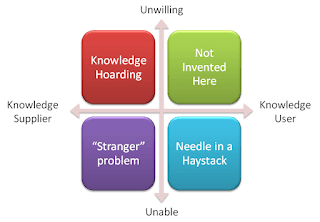The 4 barriers for Organisational Knowledge Management
- The Supplier is Unwilling to share. He or she feels they will lose something (power, job security, reputation) if they give their knowledge away.
- The User is Unwilling to learn. The unwilling user is afflicted by Not Invented Here (NIH) syndrome, feeling more secure in their own ("invented here") knowledge than in scary knowledge from somewhere else.
- The Supplier is Unable to share "I don't know who to share this with".
- The User is Unable to find knowledge - "needle in a haystack" - they don't know where to look.
21
181 reads
CURATED FROM
IDEAS CURATED BY
Life-long learner. Passionate about leadership, entrepreneurship, philosophy, Buddhism & SF. Founder @deepstash.
The idea is part of this collection:
Learn more about leadershipandmanagement with this collection
Seeking support from others
Identifying the symptoms of burnout
Learning to say no
Related collections
Similar ideas to The 4 barriers for Organisational Knowledge Management
How to design service for someone with no prior knowledge
We need to think about:
- How does someone know your service exists when they need it? Does your user know your service exists?
- How do they find it once they know it’s there? Can they find it using their own logical searches for what they’re looking for?
What’s the best price to charge for your products or services?
It depends on what your customers can afford, what they think they should pay, and what you think they’ll pay. The actual price is somewhere between these three variables.
Pricing is one of the most important decisions in business. It can make or break a company. And yet hardly anyone know...
The Angry Cognitions Scale (ACS)
It helps a user read a set of blood-boiling scenarios and rates how likely they are to have each of six possible reactions. It enables you to recognize unhelpful thoughts that cause a knee-jerk reaction. For example: When you are driving through a residential area, and someone backs their car...
Read & Learn
20x Faster
without
deepstash
with
deepstash
with
deepstash
Personalized microlearning
—
100+ Learning Journeys
—
Access to 200,000+ ideas
—
Access to the mobile app
—
Unlimited idea saving
—
—
Unlimited history
—
—
Unlimited listening to ideas
—
—
Downloading & offline access
—
—
Supercharge your mind with one idea per day
Enter your email and spend 1 minute every day to learn something new.
I agree to receive email updates

